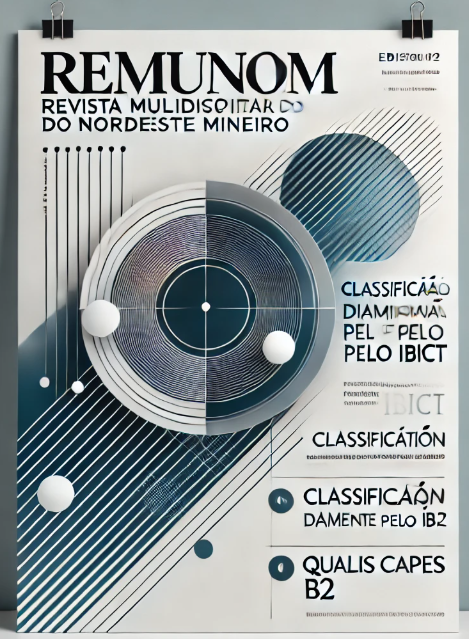RISCOS DE ACIDENTE VASCULAR CEREBRAL E INFARTO AGUDO DO MIOCÁRDIO ASSOCIADOS AO USO DE ANTICONCEPCIONAIS
Uma Revisão Integrativa
DOI:
https://doi.org/10.61164/rmnm.v10i1.4079Keywords:
Anticoncepcionais orais; Acidente Vascular Cerebral; Infarto Agudo do Miocárdio; Mulheres.Abstract
Combined oral contraceptives (COCs) are widely recognized as one of the most effective and widely used reversible contraceptive methods worldwide. The cardiovascular risk associated with the use of COCs is even more significant in women who have additional risk factors, such as smoking, high blood pressure, obesity, and migraine. These factors, when combined with the use of hormonal contraceptives, amplify the risk of serious adverse events. To discuss the relationship between the use of oral contraceptives and the risks of stroke and acute myocardial infarction (AMI) in women. This study is an integrative review of the literature. To answer the guiding question, a systematic search was carried out in scientific databases that included studies related to the topic. The databases chosen for the research were the Latin American and Caribbean Literature in Health Sciences (LILACS) and the Medical Literature Analysis and Retrieval System Online (MEDLINE) and Pubmed. The search criteria involved the use of descriptors in Portuguese, combined with the Boolean operator AND to refine the results. After an exploratory analysis of readings and the applicability of the predetermined inclusion criteria, this research consisted of 08 scientific articles that accepted and contemplated the theme in question, as well as the previously established criteria. Hormonal contraceptives are among the most efficient reversible contraceptive methods available and used worldwide. Although estrogen is attributed to the risk of venous thromboembolism due to its frequent use, it has beneficial outcomes in reducing the risk of ovarian and endometrial cancer. Therefore, it is clear that hormonal contraceptives interfere with the homeostasis of the cardiovascular system and, therefore, the importance of an investigation prior to prescribing a hormonal contraceptive for the patient, which takes into account her individual cardiovascular risks, such as age, presence of comorbidities, smoking and family history.
References
Aslan NA, et al. Low-dose combined oral contraceptives induced acute myocardial infarction. European Journal of Contraception & Reproductive Health Care, 2016; 21(6): 499-501
Bertolami MC. Warning against low-density lipoprotein oxidation in users of oral combined contraceptives. Arquivos brasileiros de cardiologia, 2018, 111(6): 771–771.
Bhullar SK, et al. Oral hormonal contraceptives and cardiovascular risks in females. Canadian Journal of Physiology and Pharmacology, 2024; 102: 572–584.
Caires, Osmar Monteiro Rodrigues, et al. "Prevalência do infarto agudo do miocárdio em mulheres e fatores de risco associados." Brazilian Journal of Implantology and Health Sciences 6.8 (2024): 1361-1372.
Costa, Bagnólia Araújo. "Risco de trombose associado à terapia dos anticoncepcionais hormonais: uma revisão de literatura." (2017).
Corrêa, D. A. S.; FELISBINO-MENDES, M. S.; MENDES, M. S.; MALTA, D. C.; MELENDEZ, G. V. Fatores associados ao uso contraindicado de contraceptivos orais no Brasil. Revista de Saúde Pública, v. 51, 2017. Disponível em: https://scielosp.org/pdf/rsp/2017.v51/1/pt.
Correia P, et al. Ischemic stroke on hormonal contraceptives: Characteristics, mechanisms and outcome. European Stroke Journal, 2021; 6(2): 205–212.
De Carvalho, Rafaela Glerean, et al. "A INFLUÊNCIA DAS PÍLULAS ANTICONCEPCIONAIS NA PRESSÃO ARTERIAL: UMA REVISÃO INTEGRATIVA." Revista Ibero-Americana de Humanidades, Ciências e Educação 10.8 (2024): 3258-3266.
Ferreira, L. F.; D’ÁVILA, A. M. F. C.; SAFATLE, G. C. B. O uso da pílula anticoncepcional e as alterações das principais vias metabólicas. Femina, v. 47, n. 7, p. 426-432, 2019.
Ferreira, Nathalia Nascimento Bezerra, and Leonardo Guimarães De Andrade. "Atenção farmacêutica na prevenção dos riscos e efeitos colaterais do uso de anticoncepcionais." Revista Ibero-Americana de Humanidades, Ciências e Educação 8.2 (2022): 839-847.
Febrasgo. Tromboembolismo venoso e contraceptivos hormonais combinados. Série orientações e recomendações. São Paulo: FEBRASGO, 2016. v. 4, n. 1.
Fabunmi OA, et al. Investigating cardiovascular risk in premenopausal women on oral contraceptives: Systematic review with meta-analysis. Frontiers in Cardiovascular Medicine, 2023; 10:1127104.
Lima, A. C. S.; MARTINS, L. C. G.; LOPES, M. V. O. et al. Influence of hormonal contraceptives and the occurrence of stroke: integrative review. Revista Brasileira de Enfermagem, v. 70, n. 3, 2017.
Mariano, G. Z.; SCHMIDT, M. M.; MATURANA, M. A.; QUEVEDO, E.; NEGRI, B.; GAZETA, C.; QUADROS, A. S.; GOTTSCHALL, C. A. M. Impacto do uso de anticoncepcional oral nas características e na evolução clínica de mulheres submetidas à intervenção coronariana percutânea primária. Revista Brasileira de Cardiologia Invasiva, v. 23, n. 3, p. 190-194, 2015.
Magalhães, Giovana Carvalho Monnerat, et al. "Anticoncepcionais Hormonais Orais e Risco de Trombose Venosa Profunda." ACTA MSM-Periódico da EMSM 9.3 (2022): 95-95.
Mendes, K.D.S.; SILVEIRA, R.C.C.P.S.; GALVÃO, C.M. Revisão integrativa: Método de pesquisa para a incorporação de evidências na saúde e na enfermagem. Texto e Contexto Enf. v. 17, n. 4, 2008.
Oliveira RPC, TREVISAN M. O anticoncepcional hormonal via oral e seus efeitos colaterais para as mulheres. Revista Artigos. Com, 2021; 28: e7507.
Pinheiro, B. M. dos S.; BARBOSA, M. P. de S.; SOUZA, M. R. de; AMARAL, R. C. do; ALMEIDA, A. C. G. de; BRITO, M. A. M. O uso de contraceptivos orais associados ao desenvolvimento de acidente vascular encefálico (AVE): revisão sistemática. Brazilian Journal of Health Review, Curitiba, v. 6, n. 3, p. 12765-12780, maio/jun., 2023.
SantosT. M. dos, MenezesM. de M. C. de, FernandesM. P., NadaisG. L., GomesM. F. de A., SilvaS. C. F. P. da, DantasR. F. de A., CanoM. E. B., & LopesB. A. (2021). Os anticoncepcionais orais como fator de risco cardiovascular: uma revisão narrativa. Revista Eletrônica Acervo Saúde, 13(9), e8592
StellaL. G., BarcarolC. L., CagolE., CasaG. M., LucianoG. H., SantosI. B. dos, BertolettiS. V., SebbenV. B., CabedaR., & AlvesG. C. S. (2025). Contraceptivos hormonais e os riscos cardiovasculares em mulheres. Revista Eletrônica Acervo Científico, 25, e19838. https://doi.org/10.25248/reac.e19838.2025
TRINH A, et al. Contraception and Cardiovascular Effects: What Should the Cardiologist Know? Women and cardiovascular health, 2023; 25: 1489 –1498.
Downloads
Published
How to Cite
Issue
Section
License
Copyright (c) 2025 Revista Multidisciplinar do Nordeste Mineiro

This work is licensed under a Creative Commons Attribution-NonCommercial-ShareAlike 4.0 International License.




